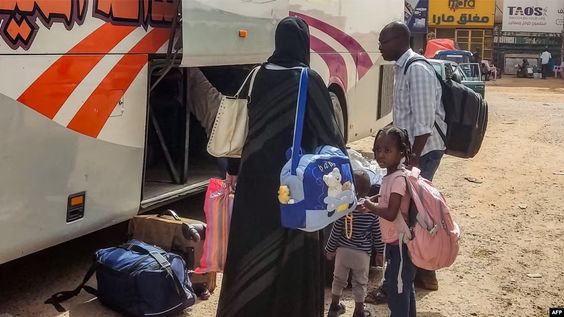Africa
Conflict Escalates in the Sudanese Capital Following the Extension of a Cease-Fire

Residents reported hearing intense clashes in the capital of Sudan on Tuesday, after military factions fighting for more than six weeks agreed to extend a cease-fire to allow aid to reach civilians.
A week-long cease-fire agreement between the army and the paramilitary Rapid Support Forces (RSF) was extended by five days just before it was set to expire late Monday night.
The truce was brokered and is being remotely monitored by Saudi Arabia and the United States, who claim it has been violated by both parties but has nonetheless enabled the delivery of aid to an estimated 2 million individuals.
“We pray this cease-fire succeeds, even if only to temporarily halt the conflict, so that we can resume our normal routines. Hind Saber, a 53-year-old Khartoum resident, stated, “The ceasefire is our only hope; we have no other options.”
Residents reported intense combat in Khartoum, Omdurman, and Bahri, the three communities that make up the greater capital of Sudan at the confluence of the Nile, hours prior to the prolongation of the cease-fire.
On Tuesday night, fighting resumed on the fringes of the cities.
In a statement, the RSF accused the army of violating the cease-fire, claiming that it had defended against an attack and seized an army base.
Nearly 1,400,000 people have fled their residences due to the conflict, including more than 350,000 who have entered neighboring countries.
The capital has been ravaged by extensive plundering and frequent power and water outages. The majority of hospitals have been closed.
The United Nations, some humanitarian agencies, embassies, and portions of Sudan’s central government have relocated their operations to Port Sudan, the principal shipping center in Sudan’s Red Sea state, where there has been little unrest.
Port Sudan is under a curfew.
The state’s security committee announced on Tuesday that it had apprehended several “rebellious” covert cells that had allegedly infiltrated from the outside and warned that they were planning activities.
“We thank the citizens of the Red Sea state for their complete cooperation and for immediately reporting the presence of these rebellious elements and their agents in their neighborhoods,” the statement read, without identifying them.
The committee extended the state of emergency and imposed a curfew in Port Sudan from 11 p.m. to 5 a.m.
The conflict broke out on April 15 over plans for a transition to elections under a civilian government that were supported by the international community.
Since 2019, when former leader Omar al-Bashir was ousted by a popular uprising, the top positions on Sudan’s governing council had been held by army and RSF leaders.
They organized a mutiny in 2021 just before handing over control of the council to civilians, but fell out over the chain of command and reorganization of the RSF in light of the planned transition.
On Tuesday, army chief General Abdel-Fattah Burhan appeared in a video saluting personnel. He stated that the army had consented to the extension of the cease-fire in order to facilitate citizens’ access to services.
“The army has not yet employed its full lethal capacity, but it will be compelled to do so if the enemy refuses to obey or listen to the voice of reason,” he said in a statement.
Millions require human aid
More than 13.6 million children in Sudan, a country with 49 million people, are in dire need of life-saving humanitarian assistance, according to UNICEF.
Since the beginning of the conflict, 17,000 metric tons of food have been stolen, according to the U.N. World Food Program, which predicts up to 2.5 million Sudanese will fall victim to starvation in the coming months.
WFP announced on Monday that it had begun distributing food in areas of the capital for the first time since violence broke out.
Tuesday, Volker Türk, the U.N.’s human rights chief, warned that the violence in Khartoum, which has extended to the war-weary Darfur region, could take on a “terrible interethnic dimension.”
Reuters
